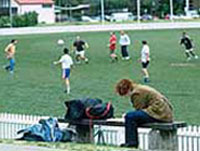Foundation of Facilitation - LAWS8077
Faculty: Faculty of Law
School: Faculty of Law
Course Outline: See below
Campus: Kensington Campus
Career: Postgraduate
Units of Credit: 6
EFTSL: 0.12500 (more info)
Indicative Contact Hours per Week: 2
Enrolment Requirements:
Pre-requisite: Academic Program must be 9200 or 9210 or 9230 or 5740 or 9235 or 5235 or 9231 or 5231 or 9220 or 5750.
CSS Contribution Charge: 3 (more info)
Tuition Fee: See Tuition Fee Schedule
Further Information: See Class Timetable
View course information for previous years.
Description
LLM Specialisations
Recommended Prior Knowledge
Main Topics
- An overview of facilitation, what are the cultural underpinnings and groups- how do they work and what is important to understand when working with a group or being part of a group.
- Boards, committees, the role of the chair, and the decision making process.
- Psychological ‘Type” and groups; how do groups work, how are individuals types (such as MBTI) exhibited in a group environment and the implications for change management, and adult learning principals.
- The application of facilitation in managing disputes in an Aboriginal context. An exploration of land based disputes and cultural paradigms.
- Conflict and groups- from bullying in schools to sentencing circles the application of transformative justice and appropriate dispute resolution.
Course Aims
- Group decision making;
- How group dynamics work;
- The overlay of group decision making in a workplace setting and how this interfaces with the legal framework;
- The way Boards operate; and
- The way stakeholders can be identified and the strategies to empower them to make good group decisions.
Learning Outcomes
- Familiarity with the areas in our society where groups need to operate together to make decisions and changes;
- A greater understanding of the challenges of regulation in these environments;
- An appreciation of the range of tools, techniques and competencies that are needed for a group to operate effectively; and
- An appreciation of where the need to use facilitation to fine tune and ensure the law is operating effectively in areas where groups are working for an outcome.
Assessment
Outline of Essay (10%)
Essay (60%)
Course Texts
Christine Hogan, Understanding Facilitation: Theory and Principles (2002, Kogan Page Publishers)
Sandy Schumann (ed) The IAF Handbook of Group Facilitation. Best Practices from the Leading Organizations in Facilitation (2005, Jossey Bass)
Additional Information









